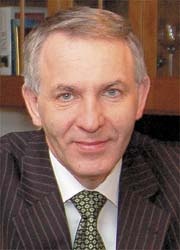Medical management in the Russian healthcare system
Healthcare in Russia is currently undergoing a comprehensive reform process. In the early 1990s, a new source of funding for the public health system was established: mandatory medical insurance and general practitioners' offices as well as private medical practice.

Thus, ‘the rules of the game’ changed whilst the total financial burden to be carried by the state did not increase. Soon, a paradox emerged: physicians had to go through years of education before being allowed to treat a patient while a healthcare manager was appointed to lead a huge hospital for thousands of patients without having had any special training.
Experienced physicians were ‘demoted’ to mere team leaders and we lost many good clinicians only to receive poor managers. The situation became even more difficult when the market economy hit Russia. Private medical clinics were actively organised by former dentists, gynaecologists and surgeons, who were bravely diving into the depth of the free market knowing almost nothing about business laws and regulations. Consequently, training programmes on healthcare management soon appeared in Russia.
An important component of such training is financial management, because the Russian healthcare system has three funding sources: state and municipal budgets, statutory medical insurance and patient’s direct payments.
A national top-priority project on healthcare is making high-tech medical technologies widely available in Russia - three of fourteen federal medical centres (Astrakhan, Penza and Tcheboksary) were launched recently. These centres are fully equipped with up-to-date medical technologies and they require profound postgraduate training for their staff, including healthcare managers.
CV: Professor Shlyakhto Eugene Vladimirovich MD studied medicine at the Pavlov Medical State University, St. Petersburg; he also gained a doctorate in science, and worked as Vice Rector for research at the university from 1994-2001.
In 1993 he was appointed Professor in the Department of Internal Medicine, of which he has been head since 1997, when he also became Director of the Cardiovascular Institute in the university.
Prof. Vladimirovich also has been Director of Almazov Federal Heart, Blood and Endocrinology Centre since 2001.
In 2004, he was a corresponding member of the Russian Academy of Medical Sciences, and is a member of various Russian medical societies and associations; among these he is Vice President of the St Petersburg Branch of the Russian Medical Association.
The professor is Editor in Chief of Arterial Hypertension (Russ.) and Vice Editor in Chief of Scientific notes (Russ.) publications. Since 1992, his monographs/books and scientific manuscripts have been many, covering his fields of interest: Arterial hypertension, heart failure, unstable angina, clinical pharmacology of antihypertensive drugs, cardioprotections and molecular cardiology.
In addition, he has participated in numerous clinical trials
01.03.2008




